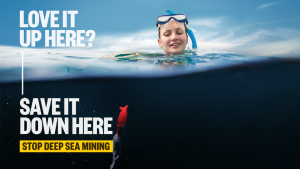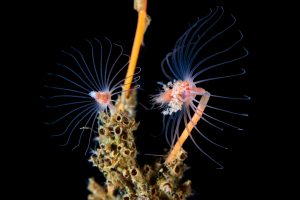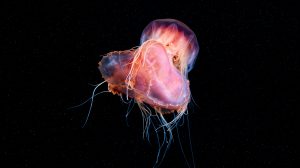Sign the petition.
Covering around 65 per cent of our planet, the deep sea contains some of the last truly pristine places on Earth. Yet we are only just beginning to explore the fascinating ecosystems and unique species that thrive in this fragile world. More than 5,000 new species have recently been discovered living in an area of the seabed considered a hot spot for deep sea mining. Scientific expeditions are shedding light on a world unlike anywhere else on Earth, with corals that can live more than 4,000 years, microscopic worms that could hold the key to understanding evolution and metal-armoured snails inspiring new engineering models.
But the deep sea is in imminent danger. Industry is increasingly attracted by the possibility of mining the seabed for materials such as cobalt, copper and manganese, which are found in its crust and nodules. As early as July this year, the world’s first commercial deep-sea mining application could be accepted by the International Seabed Authority (ISA), the intergovernmental organization that manages the ocean floor.
Blue Marine is asking the British public to sign a petition calling on the UK Government to join countries around the world in supporting a global moratorium on deep-sea mining.

The process of scraping, dredging and cutting out deep-sea minerals directly damages wildlife and habitats, and creates pollution not just from sediment plumes and wastewater, but from noise.
A British Geological Survey review for the UK Government has warned of its environmental impacts:. The use of mining vehicles, it found, is likely to cause the ‘elimination of most living organisms’ in their path, destroying habitats that include abyssal plains, seamounts and hydrothermal vents.

The ISA was established in 1994, charged with the conservation of the seafloor and the sustainable use of its resources for the benefit of all, ensuring economic development alongside environmental protection. But the regulator has adopted an excessively pro-mining position, and has granted 31 contracts for exploration, which are already under way.
At least 80 per cent of carbon locked away in the seafloor is within deep sea sediments. Far from powering a green transition, deep sea mining could release the carbon stored in these deep-sea sediments and impact this essential planetary cycle.
The reasons to ban deep-sea mining outweigh any speculative benefits. The extraction of minerals from the ocean would promote the continued exploitation of our planet’s resources, increase our footprint on the planet and would be inconsistent with global SDG 12 and 14: adopting sustainable practices by reducing and recycling our resource use and conserving life below water.

Allowing deep-sea mining would be not just reckless but unnecessary. Less than one per cent of high-demand metals are currently recycled. Evidence shows that mineral demand can be reduced by 58 per cent through technological choices, innovation, circular economies and recycling.
It has also been shown that terrestrial sources of copper, cobalt, nickel and manganese can support the complete transition to renewable energy by 2050, if supplemented by improved recycling, substitution of alternatives, smarter technology and better product design.
The deep sea provides ecosystem services that we have only begun to recognise. The far-reaching consequences of mining operations and their potentially devastating impact on biodiversity are simply not well enough understood to begin mining responsibly. We need an international moratorium on deep-sea mining — and we need it now.
Say no to deep sea mining and sign the petition here.


















